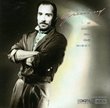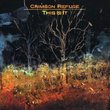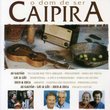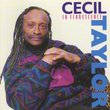| All Artists: Raymond Quintet Scott Title: Ectoplasm Members Wishing: 4 Total Copies: 0 Label: Basta Records Original Release Date: 1/1/2008 Re-Release Date: 2/12/2008 Album Type: Import Genres: Jazz, Pop Style: Swing Jazz Number of Discs: 1 SwapaCD Credits: 1 UPC: 8712530915724 |
Search - Raymond Quintet Scott :: Ectoplasm
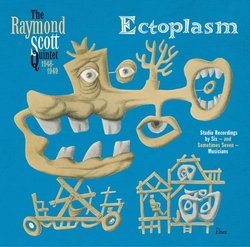 | Raymond Quintet Scott Ectoplasm Genres: Jazz, Pop
ECTOPLASM is the first new collection of unreleased Raymond Scott recordings in five years, and the first-ever of Scott's second Quintet, which recorded in 1948-49. Like its legendary 1937-39 predecessor (chronicled on 200... more » |
Larger Image |
CD DetailsSynopsis
Album Description ECTOPLASM is the first new collection of unreleased Raymond Scott recordings in five years, and the first-ever of Scott's second Quintet, which recorded in 1948-49. Like its legendary 1937-39 predecessor (chronicled on 2003's Microphone Music), this "quintet" had six members, but unlike the original RSQ, this band didn't create music associated with Warner Bros. cartoons. The 1948-49 band sounds like quintessential Raymond Scott without a nostalgic aping of the first RSQ. Scott trademarks abound: wit, sophistication, and a touch of eccentricity. Like the first, the second RSQ is complex and hyperactive, with an undercurrent of wry mischief. Both RSQ's were known for swirling horns, muted trumpet, and daredevil tempos. The style could be termed "parlor jazz," or "chamber swing"--breezy and cerebral. As a composer, Scott progressed beyond his quirky novelties of the late 1930s, while still painting "portraits in music." The album title refers to a spooky Scott work evoking a "voice from the beyond." Other Scott originals on Ectoplasm are "Street Corner in Paris," "Snake Woman," "Bird Life in the Bronx," "Curley Cue," and "Question Mark." In addition, Scott goes lunar with his visionary opus "Dedicatory Piece to the Crew and Passengers of the First Experimental Rocket Express to the Moon." The CD includes jazzed-up arrangements of the light classics "Humoresque" and "Song of India," and over a dozen Tin Pan Alley standards which clock in at less than two minutes each. These miniatures, intended as radio program interludes, demonstrate Scott's skill as an editor, distilling the essence of songs in compressed form. Tunes like "Honeysuckle Rose," and "Blue Skies" were dolled up to affirm Scott's musical identity, with melodies respected. Scott seemed to prefer jazz in service to composition rather than vice-versa. However, he took his share of liberties as a composer by integrating original intros and bridges that re-invent these relics with an unmistakable Scott spirit. Several tracks feature young vocalist Dorothy Collins crooning wordless vocals which sound eerily like a theremin. The CD was produced by Raymond Scott authority Irwin Chusid, who also wrote liner notes. The ECTOPLASM cover features an adapted 1951 illustration by legendary artist Jim Flora. In the late 1940s, Flora (1914-1998) illustrated bizarre, cartoonish jazz album covers for Columbia, and he did the same for RCA Victor during the 1950s. Similar CDs
|
CD ReviewsDedicatory piece to ectoplasm smurdge | 04/02/2008 (4 out of 5 stars) "Here's another in Basta's series of releases of Raymond Scott's music, mostly from the Scott Collection in the Marr Sound Archives. Ectoplasm focuses on Scott's quintet music of 1948-1949. Some of this music was released by Scott himself on a deluxe series of 78 rpm records. The rest is music fashioned for various radio programs.
The highlights here are the eight lesser known Scott compositions that haven't been available since the 1950s, if at all. The music is still recognizable as Scott's, though often a bit darker perhaps, and a little more complex at times. The musicians are little known but play with the same well-rehearsed (or maybe over-rehearsed) precision of the earlier more famous Scott Quintette. The standards are a mixed bag. Mostly very short to enable them to be squeezed between other features during a 15 minute radio show, they sound like attempts to graft Scott's signature sound onto recognizable tunes. Unfortunately, this tends to undermine any emotional resonance that these songs have and to make them sound even more robotic than Scott's own compositions do at times. They also illustrate how similar in sound and approach Scott's groups and the John Kirby band could be- "Humoresque" sounds almost exactly like one of Kirby's records from the late 1930s. The best of the standards here are "Who" and "Moonlight on the Ganges", which feature Dorothy Collins wordlessly singing along, blending perfectly into the ensemble and sounding like some kind of a walking talking theramin. Scott's compostions were backed on the original 78s by standards sung by Ms. Collins (with words this time). These have all been omitted from the cd except for "Tiger Rag". Instead there are a few alternate versions of a few of Scott's own pieces, which thankfully are different enough from the released versions to be interesting. 2008 is the 100th anniversary of Scott's birth. It's great that he's still remembered and listened to, and it's great that this music is easily available once again. Keep 'em coming, Basta!! " |

 Track Listings (33) - Disc #1
Track Listings (33) - Disc #1